Cabin fever
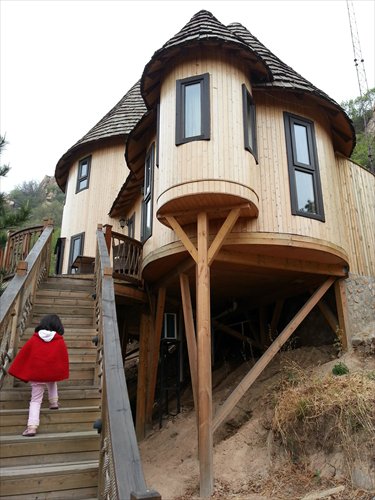
A girl and her mother spend three days living at the Fairy Tale Tree Houses in the Yunfeng Mountain Scenic Area. Photo: Courtesy of Qu Yi
For the first time in her life, 35-year-old Qu Yi was inspired to read a fairy tale to her daughter.
"Alice started to her feet, for it flashed across her mind that she had never before seen a rabbit with either a waistcoat-pocket, or a watch to take out of it," Qu read to her 4-year-old little girl, who looked at her curiously.
The mother and daughter were lying on a bed with a castle-shaped headboard. Qu glanced up from her daughter to look at the wrought iron chandelier on the roof, and wondered if she was dreaming she and her daughter were in Wonderland together.
But it was not a dream. The two were actually living in a cabin with an Alice's Adventures in Wonderland theme, built on the side of Yunfeng Mountain.
Qu never had the patience to read stories to her daughter at home, but staying in the cabin for two nights, she suddenly felt very happy to do it.
It had been a long time since Qu found the time to take a getaway with her daughter. It took a while for Qu to adjust to the slow pace of life, and be able to enjoy idling away the days in relaxation. More importantly, Qu found her daughter enjoyed it.
Qu is part of a growing trend of Beijingers who want to get away for the weekend, but are not interested in drinking beer and eating food on the rooftops of hotels beside small rivers and concrete pools stocked with fish, as guests sing karaoke and play mahjong.
An increasing number of businesses are catering to these people by providing cabin-like accommodations that are quiet and closer to nature.
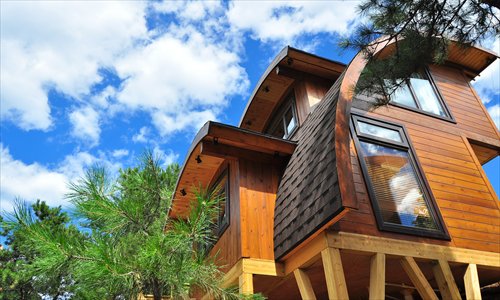
Houses in Yunfeng Mountain Scenic Area. Photo:Courtesy of Yunfeng Mountain Scenic Area
Lost in Wonderland
Qu stayed up past midnight on March 1 to book reservations at the Fairy Tale Tree Houses in Miyun county - the first day of booking for the season.
The cabins on a steep hillside are tree houses in the sense that they are made of wood, rather than built in a tree. Four of them have a tree growing inside through a hole in the floor. Competition to get a booking is fierce.
"During the first half hour after midnight, the booking website crashed," said Qu, who had a strong desire to go there after seeing beautiful pictures of the place on social media.
"Every girl has a dream of being a princess in a fairy tale. It is romantic and interesting. This place made our dream come true," said Qu, who spent 1,180 yuan ($190) per night to live in the hexagonal house, equipped with electricity and a bathroom.
Qu's daughter also loved the place. "She even asked whether she could live here forever," said Qu. Each cabin is themed on a different Western fairy tale, including Peter Pan and Little Red Riding Hood.
"In the morning it is the knocking of the raindrops and the birds singing that wake you up, which is quite different from what you can experience back in the city," said Qu.
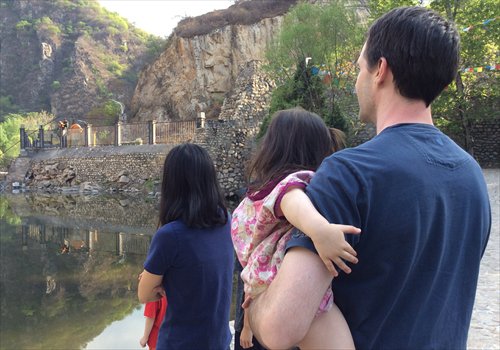
A family of five from the US go to the House of Shambhala at the Great Wall to experience Tibetan culture. Photo: Chen Ximeng/GT
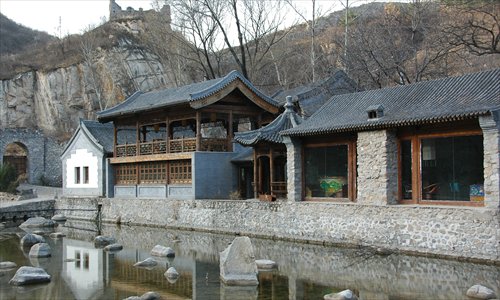
A section of the House of Shambhala lodge. Photo: Courtesy of Shambhala Serai
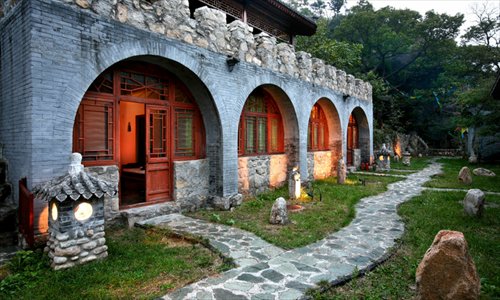
Cave houses with a Tibetan interior. Photo: Courtesy of Shambhala Serai
Tibet at the Great Wall
Timothy Blakely, a 39-year-old American, travels a lot for work, but had grown tired of industry-standard five-star hotels.
So this time, during a trip to Beijing, he decided to try something different, and chose to stay in the House of Shambhala, a Tibetan- and Manchurian-style lodge at the foot of the Great Wall in the valley of Shentangyu, Huairou district.
"I like it because it is different. It is not the same as the other hotels we usually go to. It has a little bit more flavor to it. It is a little quiet, not fancy," said Blakely, who played hide-and-seek with his five children in the courtyard of their room, which looks like a cave house with a Tibetan interior.
The 30,000-square-meter lodge lies at the foot of unrestored sections of the Great Wall built during the Ming Dynasty (1368-1644).
There are three types of rooms: Han Chinese, Tibetan and Manchurian.
The gate of the inn is built on an old beacon tower of the Great Wall.
"Everywhere is the smell of Tibetan culture and the scenery of the Great Wall," said Blakely's wife Debbie.
Seeking paradise
"In English, Shambhala means paradise," said Daukas, a Tibetan who goes by one name that works at the lodge. Daukas notes the owner is Laurence Brahm, an American lawyer, political-economist, author, and expert in green social enterprises and sustainable development.
"As a Buddhist, Brahm is the founder and CEO of Shambhala Serai, which is a sustainable heritage and eco-tourism hotel group in Tibet and Beijing that supports programs for heritage restoration," said Wang Yadong, reservation manager of the Beijing branch of Shambhala Serai.
House of Shambhala is housed in a Manchurian hunting lodge beside the unrestored Great Wall. Brahm spent two years to restore the lodge, taking inspiration from the Chengde Imperial Summer Resort, which was opened to the public in 2003. The shako, broadsword and musket of the soldiers from the Qing Dynasty (1644-1911) are displayed on the walls and tea tables of one of the Manchurian rooms.
Brahm wants to keep the original flavor and ecology of Tibetan and Manchurian people through the decorations of the separate residences, said Wang. "All we hire here is Tibetan people. They are not strictly trained like the service staff in standard hotels. This gives travelers a more relaxed feeling."
"The yellow curtains and bed sheets, the pillow with Buddhism images and colorful prayer flags everywhere make this place unique," said Debbie Blakely, who is very interested in Tibetan culture.
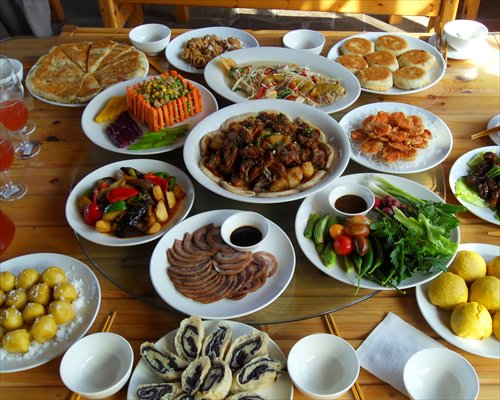
A meal from Yueshi House featuring locally milled grain, meat from village-raised livestock and local vegetables. Photo: Courtesy of Yue Haiping
Quiet stone houses down the valley
In 2003, 53-year-old Yue Haipeng went to Huayuan village, Xinchengzi township, to find a place where he could spend the rest of his life in leisure.
"I built a two-storey house made of stone taken from the valley. It is very comfortable, cool in the summer and warm in the winter," said Yue. He installed traditional stone beds with fire pits under them to stay toasty on winter nights. Yue also plants different crops and raises farm animals.
Yue intended to build himself a retirement home, but the visits of more and more friends have inspired him to build a "Shangri-la" for more travelers.
There are now six stone houses and another six cave houses in the resort, called Yueshi House. He also has built 19 wooden cabins beside a stream in the valley, where young students from schools in Beijing come to conduct team building exercises.
In September 2011, Cui Yihan happened to find Yueshi House during a hike. She could not forget the authentic food and drinks, all made by Yue. She has been a frequent visitor since then, noting, "Autumn is the most beautiful season for the travelers living here. The red creepers hanging over the walls and roof of the stone houses, the ripe fruits which you can freely pick in the valley, the glimpse of the unrestored Great Wall on your way up the valley, all leave good memories for us," she said.
"This house is quite different from most farmhouses or resorts run by the local villagers. People can taste the authentic food there, they can fish in man-made ponds, but they can not fully relax due to too many artificial facilities. But here, the valley where the house is located has been preserved very well by the owner, and you will feel closer to nature."
As people become more affluent, they will seek out more places where they can recharge.
"People now are more discerning, so we want to find more special destinations to go far from the urban hubbub," said Qu.
This summer, she plans to bring her mother to the tree houses in the scenic spot where they could enjoy a large area of lavender in the lavender garden, visit the temple and have the vegetarian food in the restaurant.
Arrange your escape
Fairy Tale Tree Houses
Where: Yunfeng Mountain, Yanluo village, Bulaotun town, Miyun county
Website: www.yunfengshan.com
Phone number: 81098688
Shambhala at the Great Wall
Where: No.28 Xiaguandi village, Yanqi town, Huairou district
Website: www. shambhalaserai.com
www.redcapitalclub.com.cn
Phone number: 84018886, 64027150
Humble house in the mountains (Shanlihanshe)
Where: Ganyugou village, Beizhuang town, Miyun county
Phone number: 13683067882
The CTSHK RV Park of MYNS
Where: No.88 Hedong Lu, Henanzhai town, Miyun county
Phone number: 89087788
Commune by the Great Wall
Where: Shuiguan, Badaling Highway, Great Wall, Yanqing county
Phone number: 81181888
Yueshi House
Where: Huayuan village, Xinchengzi town, Miyun county
Website: blog.sina.com.cn/wulingxigu
Phone number: 15801467879